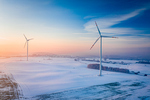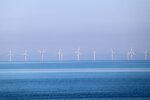News Release from windfair.net
Wind Industry Profile of
Raising interest in Kazakhstan
With more than 2.7 million square kilometers of land, Kazakhstan is the largest landlocked country and the ninth largest state in the world. Despite this, the huge territory, which is mainly characterized by the Kazakh steppe, is home to just under 19 million inhabitants.
Geographically, the former Soviet republic is separated from Russia by a 7600-kilometer border. Geopolitically, however, cooperation with Russia is currently on hold due to the war in Ukraine. Instead, other major powers are vying for the attention of the resource-rich country, which has, among other things, various rare earths that are particularly necessary for energy production.
And Kazakhstan is well aware of its position at the center of attention. This became clear last week at the Astana International Forum (AIF), which is designed to serve as a platform for global middle powers to put their own views and positions front and center and be heard. "The Astana International Forum was created to respond to global challenges, prioritizing cooperation as the fundamental principle of the international system. Kazakhstan has a long history of developing constructive international relations serving as a bridge between East and West," said President Qassym Shomart Toqayev.
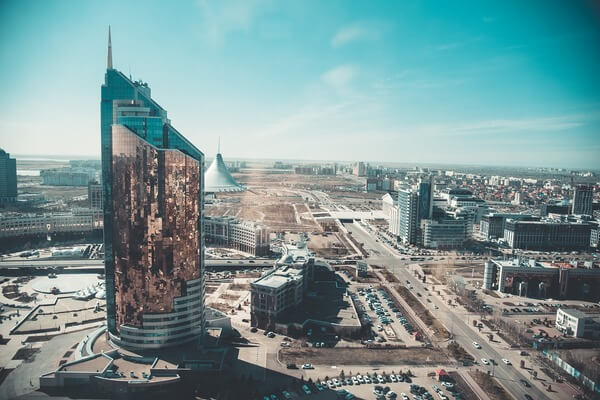
Astana has been transformed into a modern city in recent years (Image: Pixabay)
For a long time, a competition for influence has been raging in Kazakhstan between Russia on the one hand and the U.S. as the second largest foreign investor on the other. In addition, the Chinese, with whom the country shares an 1,800-kilometer border, have increasingly joined the fray in recent years, alongside the heavily wealthy oil powers from the Middle East. Traditionally, Russia has acted as a regulatory power in Central Asia in the past, while China was primarily economically active there. But those days are over now that Russia is isolated internationally.
And so Europe has also become increasingly interested in Kazakhstan. In the course of the AIF, various talks were held with representatives of European countries and companies in order to reach "new stages of cooperation," as the government explained. They also focused on the implementation of the strategy for Kazakhstan to achieve carbon neutrality by 2060 and the related gradual transformation of economic sectors.
Achieving climate goals poses a major challenge for Kazakhstan. Reducing greenhouse gas emissions requires fundamental changes in production and consumption models, a rapid and efficient transition from non-ecological burning of fossil energy resources to carbon neutral technologies, large-scale technological modernization, and attracting "green" investments in all sectors of the national economy. And so it is certainly no coincidence that next week German President Frank-Walter Steinmeier will travel to Kazakhstan with a business delegation.
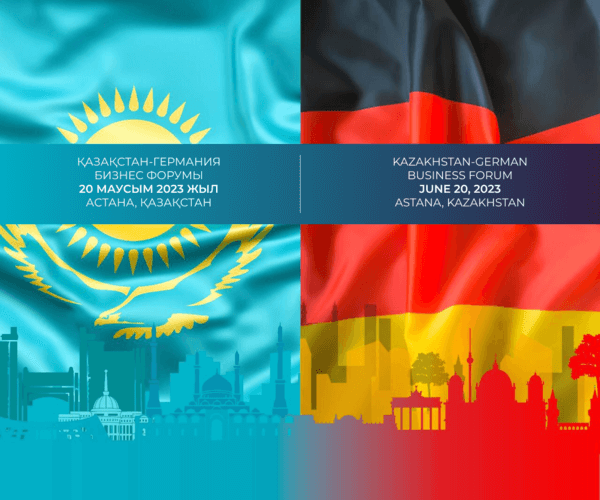
Advertising for the upcoming visit from the West next week (Image: Kazakh Invest).
This is also about Europe finding a strong response to the activities of competitors from the Middle and Far East. In recent days two major projects in the field of renewable energy with Arab companies have been announced: Masdar of the United Arab Emirates has signed a roadmap to develop up to one gigawatt of wind power in Kazakhstan to support the country's goal of generating half of its energy mix from renewables by 2050. "The UAE and Masdar are proud to be supporting Kazakhstan’s renewable energy goals. This wind project, which will generate up to 1 GW of clean electricity to power homes and cut emissions, shows sustainable development in action. [...] As proud hosts of COP28, the UAE is deeply committed to investing in and partnering with countries to boost clean energy around the world."
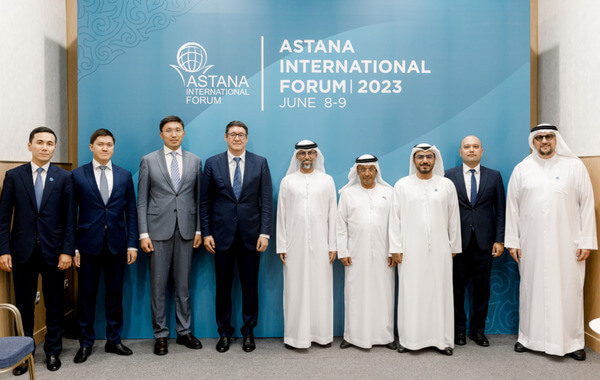
The Astana International Forum also served to close various deals (Image: Masdar).
Saudi Arabia's ACWA Power also announced such project last week. With an investment of US Dollar 1.5 billion, the agreement is the largest Saudi investment into the Kazkh energy sector to date. Thus Europe and China will have to be careful not to be cut off very quickly.
- Author:
- Katrin Radtke
- Email:
- press@windfair.net
- Keywords:
- Kazakhstan, China, USA, Russia, Europe, middple power, rare earth, renewable energy, Arabic, investment, wind project


